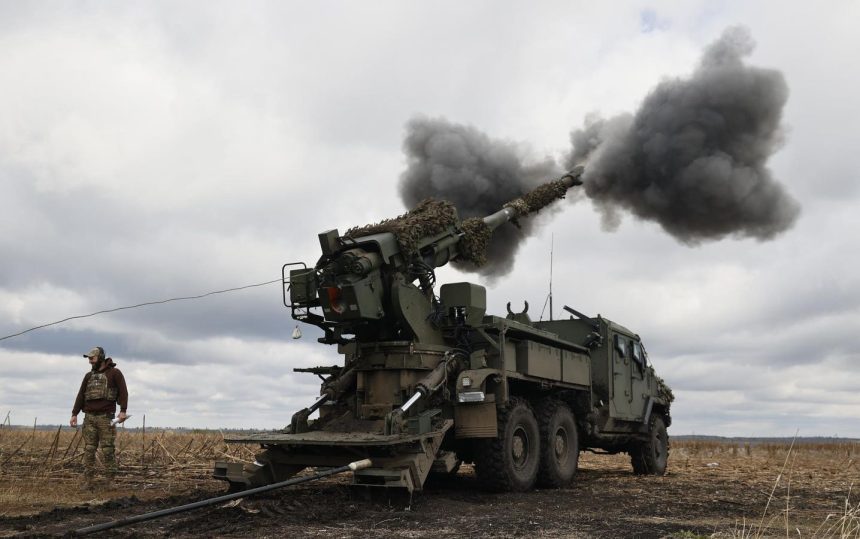The war in Ukraine, dragging into its third year in mid-2024, witnessed a shift in strategy as Western military aid began to wane. Kyiv, with the support of European allies, embarked on an initiative to bolster domestic weapons production. This endeavor, dubbed the “Danish model,” aimed to reduce Ukraine’s reliance on foreign aid while simultaneously strengthening Europe’s defense capabilities in the long run. Denmark spearheaded the initiative, providing substantial financial backing and oversight, with other Northern European nations soon following suit. This collaborative approach injected over half a billion dollars into Ukraine’s defense industry in 2024, earning praise from President Zelensky and prompting calls for its expansion. The initiative represented a crucial step towards self-sufficiency and long-term security for Ukraine while offering a promising model for bolstering European defense.
However, a sudden upheaval in late January 2025 threatened to derail this promising development. Defense Minister Rustem Umerov unexpectedly suspended Maryna Bezrukova, the director of the Defense Procurement Agency (DPA), the very agency responsible for the success of the Danish model. Bezrukova, a renowned reformer, had brought transparency and accountability to the procurement process, a historically opaque and corruption-prone sector within Ukraine. Umerov’s action sparked immediate outrage from anti-corruption activists and Western diplomats, raising concerns of a resurgence of authoritarian tendencies within the Ukrainian government. This move was perceived by many as a blatant attempt to dismantle the progress made in combating corruption and strengthening independent institutions, a critical aspect of Ukraine’s ongoing transformation. The ensuing power struggle between Umerov and Bezrukova, played out in the public eye, highlighted the fragility of institutional reforms in the face of entrenched political interests.
The dismissal of Bezrukova and the subsequent weakening of the DPA’s supervisory board carried significant implications for Ukraine’s future. Beyond the immediate impact on the defense industry, the incident raised doubts about the rule of law and the government’s commitment to combating corruption. These concerns threatened to jeopardize not only ongoing military aid but also crucial Western investment in Ukraine’s post-war reconstruction and development. The West, closely observing these developments, made it clear that continued financial support hinged on Ukraine’s adherence to good governance principles and the strengthening of independent institutions. The incident underscored the delicate balance between wartime exigencies and the imperative to maintain democratic progress.
Prior to Bezrukova’s appointment, military procurement in Ukraine, as in many nations, was plagued by secrecy and corruption. Despite the successful implementation of the ProZorro online system, which brought transparency to public contracting in other sectors, the defense ministry remained resistant to its adoption. In 2023, following major scandals within the armed forces, the DPA was established to oversee the procurement of weapons and ammunition, separating lethal purchases from other military spending, which fell under the purview of ProZorro. Bezrukova, with a proven track record of reforming procurement processes, was tasked with streamlining the DPA and eliminating corrupt practices. Her mandate was to ensure efficient and transparent spending of the agency’s substantial budget, prioritizing direct procurement from Ukrainian manufacturers while minimizing reliance on opaque third-party intermediaries.
Bezrukova’s tenure at the DPA witnessed remarkable progress. Through rigorous internal reforms and stringent due diligence, she managed to significantly reduce reliance on third-party dealers, favoring direct contracts with Ukrainian manufacturers. This achievement instilled confidence in Western partners, who had previously been hesitant to invest in Ukraine’s defense sector due to concerns about corruption and mismanagement. The Danish model, a direct outcome of Bezrukova’s efforts, demonstrated the viability of direct foreign investment in Ukrainian weapons production, providing a much-needed boost to the country’s defense capabilities. However, this success, ironically, seemed to invite resistance from within the defense ministry, culminating in anonymous threats and orchestrated smear campaigns against Bezrukova.
The Danish model represented a mutually beneficial solution for both Ukraine and its European allies. Facing dwindling military stocks and budgetary constraints, Denmark sought innovative ways to continue supporting Ukraine’s war effort. Direct investment in Ukrainian weapons production proved to be an effective alternative to traditional military aid. This approach allowed Denmark to maximize its contribution while simultaneously stimulating Ukraine’s domestic defense industry. Moreover, producing weapons in Ukraine offered several advantages: lower production costs, faster delivery times, and a greater responsiveness to the evolving needs of the Ukrainian armed forces. This innovative approach addressed both the immediate need for military hardware and the long-term goal of strengthening Ukraine’s defense sector. The success of the Danish model attracted the participation of other European nations, promising a significant increase in investment in Ukrainian weapons production in the coming year. The unexpected dismissal of Bezrukova, however, cast a shadow over the future of this vital initiative, leaving its fate hanging in the balance. The G7 nations, recognizing the importance of maintaining transparency and good governance, urged Kyiv to swiftly resolve the issue and restore confidence in the DPA, underscoring the crucial link between institutional reform and continued international support.



